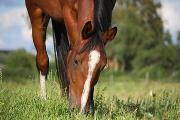Effective Treatment of Equine Gastric Ulcer Syndrome

Bismuth subsalicylat, the ingredient found in Pepto-Bismol, has long been used to treat diarrhea, nausea, indigestion, and heartburn in people. Because of its use, it has been questioned whether bismuth can be used effectively to treat Equine Gastric Ulcer Syndrome (EGUS), a very common ailment among horses of all ages.
Positives
In humans, bismuth is known to:
- Coat tissues
- Promote healing
- Inhibit pepsin activation
- Increase the secretion of mucous.
Negatives
When in the equine gastrointestinal tract, bismuth may convert to sodium subsalicylate. Salicylates:
- are similar to aspirin in that they decrease prostaglandin secretion
- may further damage the gastric system.
For these reasons, the use of bismuth as an effective treatment of equine gastric ulcers is not recommended.
Omeprazole
At this time, omeprazole is the only FDA-approved drug identified to effectively treat EGUS, and works to inhibit gastric acid secretion.
Study Results
Buchanan and Andrews (2003) reported findings on a study of 147 horses identified with gastric ulcers. All horses were put on a 28-day regimen of omeprazole and the end result showed physical improvements in:
- Weight gain
- Appetite
- Attitude
- Appearance
Further endoscopic examinations of the ulcers showed:
- 65% healed
- 94% improved
Findings stated that the primary reason of any failure was due to owner compliance and incorrect dosing. Additional studies also showed that in the use of omeprazole:
- 99% of spontaneous ulcers found in adult horses and foals older than 4 weeks were improved
- The rate of ulcer healing, specifically in racehorses, was increased
FDA-Approved Products
Two omeprazole products that are FDA-approved for use in the effective prevention and treatment of equine stomach ulcers are:
- ULCERGARD® - marketed as preventing equine stomach ulcers
- GASTROGARD® - marketed as treating and healing stomach ulcers, and reducing new developing stomach ulcers
Both ULCERGARD® and GASTROGARD® are registered omeprazole products of Merial Limited.
Dangers
Omeprazole is often illegally compounded and marketed without obtaining FDA approval. A recent statement released by the FDA warned that these non-approved drugs are produced without control of the formulation, drug concentration, or drug quality.
Positives
In humans, bismuth is known to:
- Coat tissues
- Promote healing
- Inhibit pepsin activation
- Increase the secretion of mucous.
Negatives
When in the equine gastrointestinal tract, bismuth may convert to sodium subsalicylate. Salicylates:
- are similar to aspirin in that they decrease prostaglandin secretion
- may further damage the gastric system.
For these reasons, the use of bismuth as an effective treatment of equine gastric ulcers is not recommended.
Omeprazole
At this time, omeprazole is the only FDA-approved drug identified to effectively treat EGUS, and works to inhibit gastric acid secretion.
Study Results
Buchanan and Andrews (2003) reported findings on a study of 147 horses identified with gastric ulcers. All horses were put on a 28-day regimen of omeprazole and the end result showed physical improvements in:
- Weight gain
- Appetite
- Attitude
- Appearance
Further endoscopic examinations of the ulcers showed:
- 65% healed
- 94% improved
Findings stated that the primary reason of any failure was due to owner compliance and incorrect dosing. Additional studies also showed that in the use of omeprazole:
- 99% of spontaneous ulcers found in adult horses and foals older than 4 weeks were improved
- The rate of ulcer healing, specifically in racehorses, was increased
FDA-Approved Products
Two omeprazole products that are FDA-approved for use in the effective prevention and treatment of equine stomach ulcers are:
- ULCERGARD® - marketed as preventing equine stomach ulcers
- GASTROGARD® - marketed as treating and healing stomach ulcers, and reducing new developing stomach ulcers
Both ULCERGARD® and GASTROGARD® are registered omeprazole products of Merial Limited.
Dangers
Omeprazole is often illegally compounded and marketed without obtaining FDA approval. A recent statement released by the FDA warned that these non-approved drugs are produced without control of the formulation, drug concentration, or drug quality.
Information at Your Fingertips
Veterinarians and horse owners need to be alert when considering products that claim to use omeprazole as an active ingredient. When concerns arise about an animal drug, FDA-approved drugs can be researched in the US Food and Drug Administration database at: http://www.accessdata.fda.gov/scripts/animaldrugsatfda/.
Buchanan, BR and Andrews F.M. Treatment and prevention of equine gastric ulcer syndrome. Vet Clin Equine 19 (2003) 575-597.


Working Here
Our team members are encouraged to be the best they can be... at Covetrus we believe we impact one another.
Learn MoreNews & Events
FDA Cautions Pet Owners Not to Feed Texas Tripe Inc. Raw Pet Food Due to Salmonella, Listeria Monocytogenes
The U.S. Food and Drug Administration is cautioning pet owners not to feed their pets any of the Texas Tripe brand raw frozen pet food listed below because several samples of Texas Tripe raw pet food have tested positive for Salmonella and/or L. mono.
Careers
Are you looking for a place to let your talents shine? At Covetrus, we help our practitioner customers better serve their patients and take pride in providing the best customer experience possible. Search our open positions to see our available opportunities.
Newsletter
Stay current with what’s going on with Covetrus, subscribe to receive our newsletter and email communications. Subscribers will receive the latest information in practice management, sales and marketing, animal health, and more.



-3-(1).png?sfvrsn=2d806d73_0)

Leave a comment